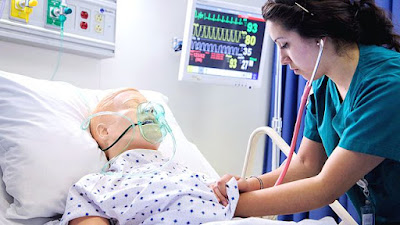Medical Simulation: Empowering Healthcare Professionals Through Virtual Practice
 |
| Medical Simulation |
Medical simulation has emerged as a powerful tool in healthcare education, empowering healthcare professionals through virtual practice. With the rapid advancement of technology, traditional methods of training have been complemented and enhanced by realistic and immersive simulated experiences
According To Coherent Market Insights, the global Medical Simulation Market was estimated to be worth US$ 1,712.0 Mn in 2021 and
is anticipated to grow at a CAGR of 12.4% between 2022 and 2028 to reach US$
3,864.2 Mn.
One of the key benefits of medical
simulation is the opportunity it offers for learners to engage in realistic
scenarios that closely resemble the challenges they will face in clinical
practice. By utilizing advanced virtual environments, healthcare professionals
can simulate complex procedures, critical decision-making, and patient
interactions. This enables them to refine their clinical judgment, enhance
their technical skills, and develop a deeper understanding of the
interconnected nature of healthcare delivery.
Virtual practice in Medical Simulation provides a safe and
controlled environment for healthcare professionals to make mistakes and learn
from them without jeopardizing patient safety. By allowing learners to
experience the consequences of their decisions and actions in a risk-free
setting, medical simulation promotes a culture of continuous learning and
improvement. Mistakes made during simulation can be analyzed, discussed, and
debriefed, fostering reflection and enhancing performance in real-life
scenarios.
Furthermore, medical simulation
transcends geographical boundaries and time constraints, making it accessible
to a wide range of healthcare professionals. Through online platforms and
virtual reality technology, learners can engage in simulated experiences from
anywhere at any time, facilitating remote learning and collaboration. This
democratization of medical education allows healthcare professionals to access
training opportunities that were previously limited by physical proximity to
training centers or scarcity of resources.
Medical Simulation also plays a crucial role in interprofessional
education, promoting effective teamwork and communication among healthcare
providers. By simulating interdisciplinary scenarios, such as emergency
situations or complex patient cases, medical simulation fosters collaboration,
enhances communication skills, and strengthens the ability to work cohesively
as a team..
In the scientific discipline of
biomimetics, ideas are drawn from nature in order to create useful products and
systems that can mimic the composition and operation of natural biological
systems. It refers to the application of natural models in the development of
new technologies. To put it another way, in Medical Biomimetics, people try to model their designs after natural systems and
instances.
In conclusion, medical simulation
has become a cornerstone in empowering healthcare professionals through virtual
practice. By providing realistic and immersive learning experiences, medical
simulation enhances clinical skills, fosters critical thinking, and promotes
teamwork. The safe and controlled environment of virtual practice allows
learners to make mistakes, learn from them, and continuously improve their performance.



Comments
Post a Comment